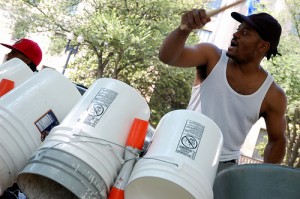Go-Go In D.C.’s Neighborhoods: Soon To Be a Thing of the Past?

Flickr: Steven Snodgrass
D.C. street musicians play go-go, but full-fledged city shows are becoming more and more scarce.
This post comes to us courtesy of Anne Hoffman, an intern producer for the Kojo Nnamdi Show. Nnamdi will discuss the past, present and future of go-go at 1 p.m., Thursday.
“If go-go stopped, I don’t even know,” says musician Sweet Cherie, “it would be like Armageddon or something.” But go-go, for some the heartbeat of Washington D.C., the city’s answer to a regional sound, is losing territory. For many years now, go-go venues have been shut down inside D.C. due to club violence and liability issues, pushing the music further out into the Maryland suburbs like Prince George’s and Charles counties. Meanwhile punk rock, another D.C. musical mainstay, is not experiencing the same bad luck.
In March 2011 Washington City Paper article, reporter Sadie Dingfelder investigated neighborhood responses to two different music warehouses: go-go venue Caveyard and punk rock house The Hole in the Sky (HITS). The go-go venue was shut down before it even had its first event, while it took cops a year to close the punk rock house. Yet both places were shut down for the same reason: “no Certificate of Occupancy and insufficient fire exits.” Dingfelder says that the neighbors called the police and fire marshal before the booked go-go bands listed on the flyer – among them T.O.B. and T.E.– could set foot on stage at the Caveyard.
In an e-mail to DCentric, Dingfelder explained the background of her piece, writing, “I think the story is a twist on the usual story of racism. Here, I think, a mostly black neighborhood sees groups of young black people as a bigger threat than groups of white kids, even though the white kids are more overtly anti-establishment. I’m curious why go-go is seen as a stronger destabilizing force than punk.”
Since the 1980s, go-go has been associated by local police and community leaders with drug and gang related violence. But many go-go fans say that the musicians and percussion-heavy songs they play have nothing to with the feuds that sometimes break out at performances.
Rare Essence publicist and go-go fan Brandi Dunnegan argues that go-go music provides a space where different community residents come together, and some of those residents have problems with each other. The result is the subsequent violence that ultimately receives the most – and loudest – media attention.
Rather, advocates say that go-go has provided a deeply positive outlet for many of D.C.’s poorest and most vulnerable residents. Some musicians cite go-go as the reason they stayed in school, and in some cases, alive. For Chi Ali of Suttle Thoughts, singing in his go-go band was not an option unless he behaved well and did his homework. Performing in go-go shows can also be a ticket to community recognition and respect, as in the case for Backyard Band’s Anwan Glover who went on to play Slim Charles on The Wire.
ANC Commissioner Tim Clark was quoted in Dingfelder’s article as saying, “Our community is turning that corner between violent crimes to become a more safe, stable community… I don’t think go-go is what our community needs at this time. We need stable retail and to attract people to our community who want to build lives.”
Perhaps go-go could be the very force that contributes to a stronger community and arts scene, just as neighbors believe punk is doing already.






